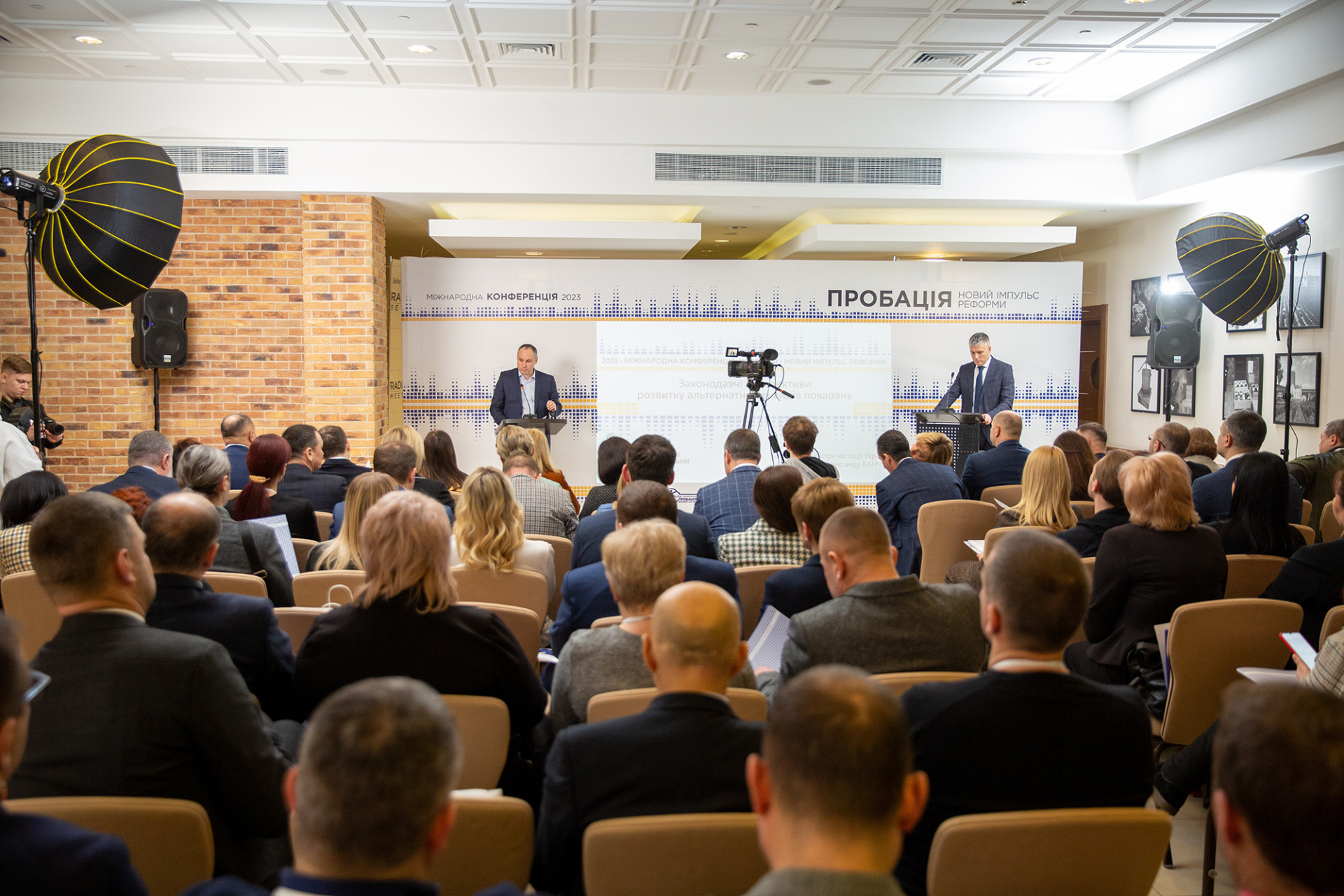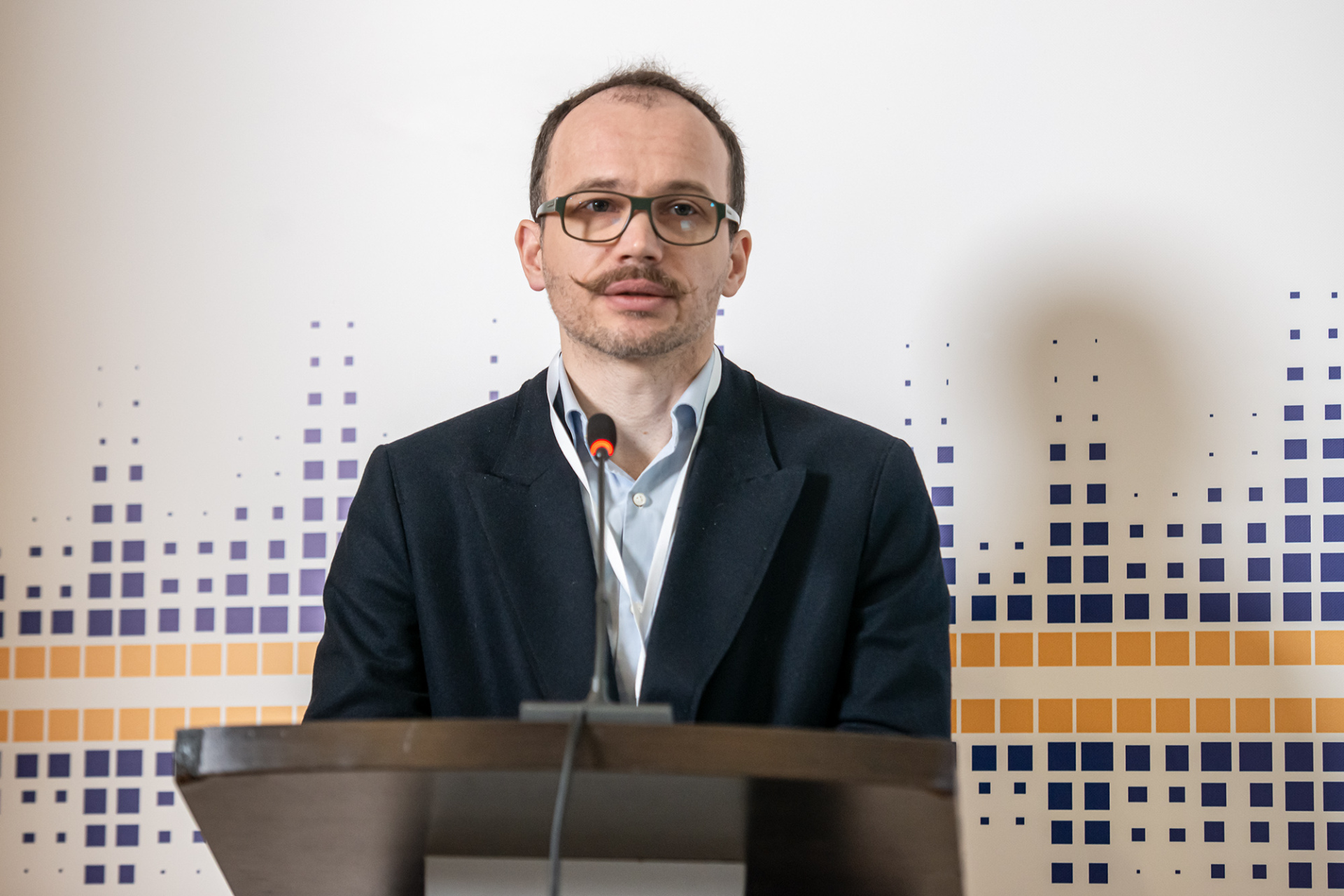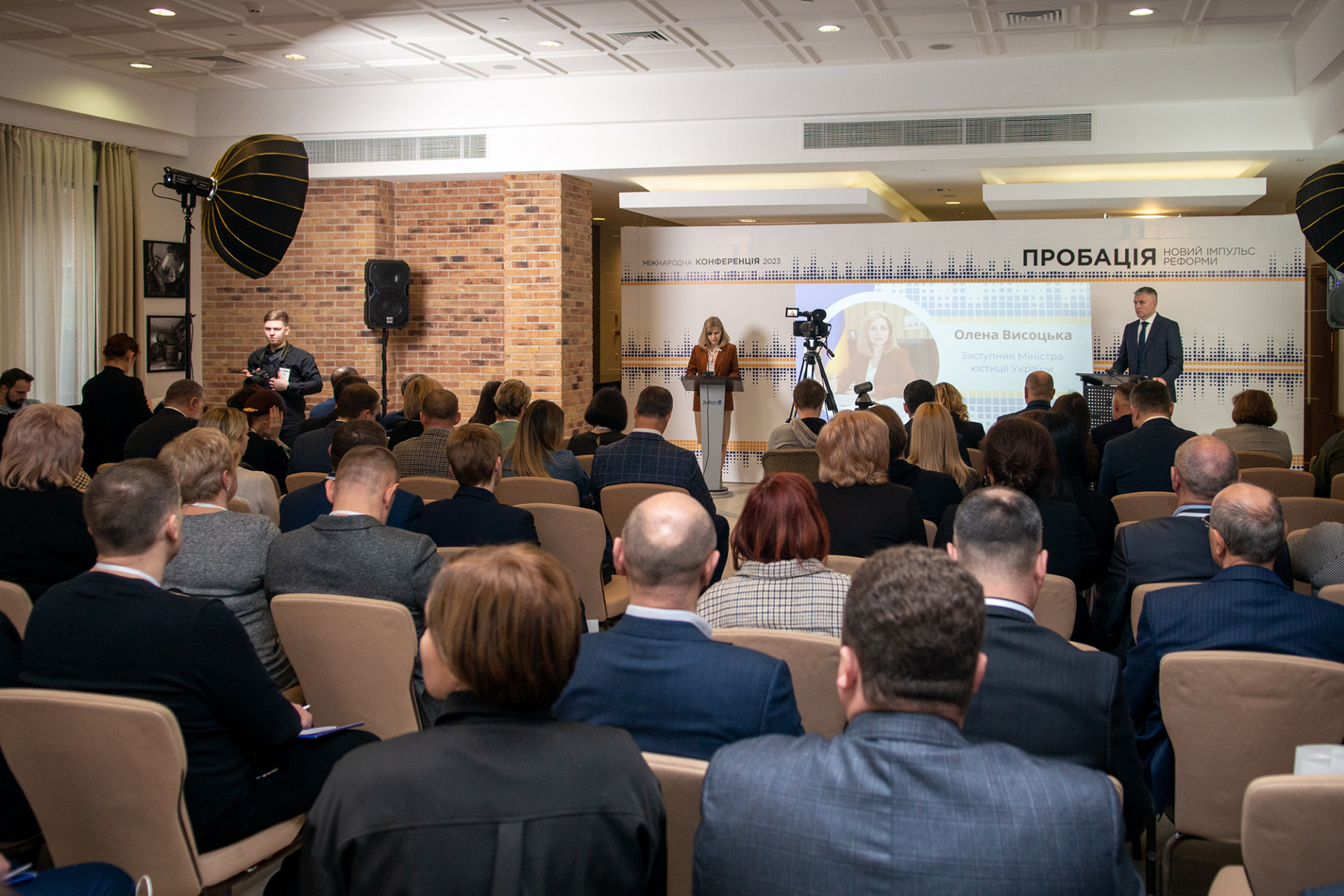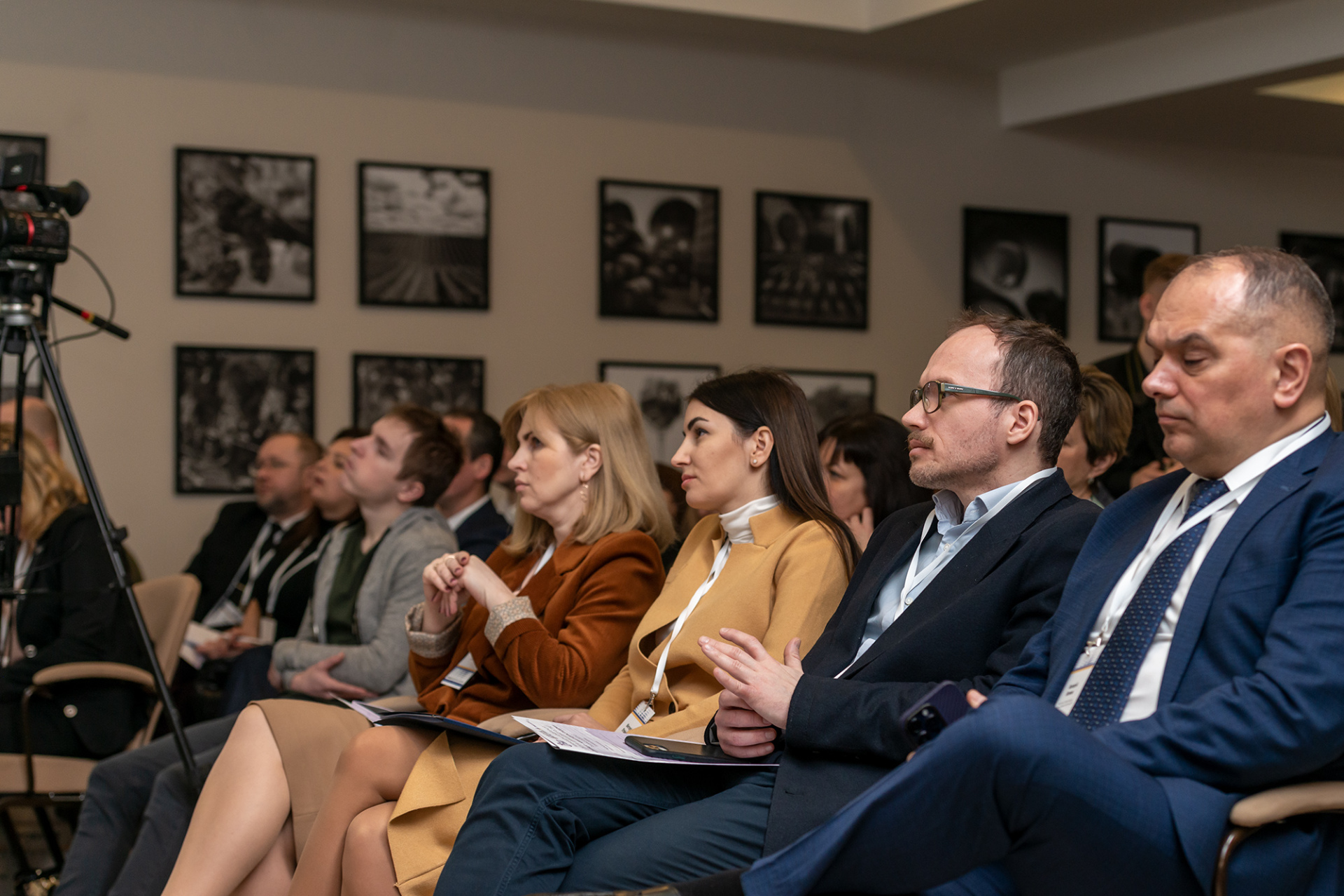Probation – a New Impetus for Reform: EU Project Pravo-Justice co-organized an International Conference

On February 16, the EU Project Pravo-Justice together with the Ministry of Justice of Ukraine and the State Institution Probation Centre held International Conference on Criminal Justice “Probation – a New Impetus for Reform”. For eight hours, representatives of the executive power, the Prosecutor General’s Office, the Probation Centre, Members of Parliament, judges, lawyers, NGOs representatives, and EU Project Pravo-Justice national and international experts discussed the achievements of probation reform in Ukraine and shared plans on how to further develop alternative measures and sanctions for persons who have committed a criminal offence.
Addressing the participants of the event with a welcome speech, Denys Maliuska, Minister of Justice of Ukraine, briefly outlined probation achievements, in particular, in wartime in the year 2022. Making an analogy with doctors’ work, he said that probation authorities have an important task “not to cut off what can be cured and at the same time not to switch to homeopathy or non-evidence treatment, but to remain focused and work with the causes of the disease”, i.e., with the causes behind crime.

“Our goal is for people to really change. Our task for the next three years is to use scientific approach and evidential probation in our system as much as possible: so that we measure every tool we use, so that we monitor the consequences, look at statistics and sometimes conduct experiments within the limits and in the manner prescribed by law. Different punishments were applied to the same persons and it was monitored what works best,” said Denys Maliuska. The Minister assured that if Ukraine moves in the right direction and fast enough, it has every chance to become the best in the world in terms of using alternative sanctions.
In her welcoming speech, Olena Vysotska, Deputy Minister of Justice noted that probation, an alternative to short-term imprisonment, has in recent years proven to be effective in practice although there is still work to be done. She noted that it is important not only to improve the legislation that regulates this area and to offer new digital solutions but also to raise awareness about probation.

“Ukrainian society should learn more about the advantages that probation has as compared to classic punishment via imprisonment. Since the Soviet era, we have had the false idea that imprisonment can solve all problems with an offender,” said Olena Vysotska.
In his welcoming remarks, Valerii Bozhyk, Deputy Chair of the Parliamentary Committee on Legal Policy, noted that it is necessary to adjust and improve the criminal justice system in place.
“Our task is not simply to change the list of existing types of punishments, but rather to introduce such a set of measures that will correspond to public interests, worldview and values,” said Valerii Bozhyk. He noted that the respective Parliamentary Committee is working on a number of draft laws aimed at improving the penitentiary system reform.
Viktoriia Litvinova, Deputy Prosecutor General of Ukraine, spoke about the interaction between probation authorities and law enforcement agencies. She emphasized that in the future, all law enforcement agencies and the judiciary should apply more non-custodial punishments.
“Probation institutions make it possible to solve convicts’ behavioural issues more widely and conceptually. Psychologists can work with delinquents, and probation authorities can become a partner that will help them find a job, get a profession, and study,” Viktoriia Litvinova said.
Oleh Yanchuk, Director of the Probation Centre, spoke about how probation was developing step-by-step, about its institutional capacity, efficiency, and plans to expand probation tools.
“The adoption of the Law of Ukraine On Probation eight years ago is a strategic decision. During this time, the system has helped thousands of our citizens, and its activity does not end there. Only 4% of convicts commit serious probation violations. In the future, we plan to improve the list of types of sanctions that are not related to deprivation of liberty, to improve methods and tools for convicts’ correction and resocialization,” Oleh Yanchuk said.
Iryna Zharonkina, Property Rights and Enforcement Component Lead of EU Project Pravo-Justice, covered the importance of developing probation reform in the light of European integration activities.
“The European Commission and, in particular, EU Project Pravo-Justice have been supporting probation reform starting from 2015 – when the Law on Probation entered into force. We are glad that for these eight years, we have been able to participate in developing probation – developing a system to assess the risks of reoffending, drawing up curricula, and supporting the institutional capacity building for probation. In the future, both the Ministry of Justice and the Probation Centre can count on our support,” assured Iryna Zharonkina.

Oleksandr Banchuk, Deputy Minister of Justice of Ukraine, spoke about legislative developments in the penitentiary, shared further legislative plans and outlined the main novelties of government legislative initiatives submitted to the Parliament of Ukraine.
“When these draft laws are adopted, we will be able to ensure better public safety, reduce the number of prisoners and detainees in detention centres, ensure correction of offenders without isolation from society, and also save budget funds. If society understands the benefits and functions of this reform – that a humane approach in the field of effecting of sanctions is more effective than the principle of revenge, we will have the prospect of living in a safer society,” said Oleksandr Banchuk.
The evolution of approaches of EU countries in the field of effecting sanctions was covered by Hugues de Suremain, Director of Litigation and Advocacy, European Prison Litigation Network. He said that in recent years this policy is aimed at reducing the number of the prison population and respecting convicts’ fundamental rights, such as the right to health care and medical assistance.
“The probation system is extremely important because it allows to reduce the prison population and leads to much less problems that can exist in prisons,” said Hugues de Suremain.
Serhii Orlov, Deputy Minister of Justice, spoke about successful IT solutions that have already been implemented in the field of probation and covered their further improvement. First of all, it is about the Convicts Register – it is planned to enter 100% of archival cases into the Register by the summer. The Deputy Minister also shared plans on developing a special mobile application “My Probation”. It will be possible to run many processes related to serving an alternative sentence online – from signing up to communicating with representatives of the probation authorities.
“We plan to make this tool voluntary and expect that most probation clients will want to use it. We plan to complete the technical development of the first version of the application this year and immediately launch it for piloting,” said Serhii Orlov.
During her speech, Valeriia Kolomiets, Deputy Minister of Justice, focused on cooperation between free legal aid system staff and probation authorities.
“Over the past 5 years, specialists of the free legal aid system have provided several thousand on-site consultations. Thus, almost all probation clients were able to receive the legal support they are entitled to – this right is guaranteed by the state. Several hundred law-awareness activities for probation clients were also held. This is important because such people often feel abandoned and ostracized. Therefore, it is important to show such people that they are also members of society, that they are re-socialized and can realize themselves in this society,” Valeriia Kolomiets said.
She also mentioned that probation authorities are actively involved in implementing restorative justice project for children.

During the event, a lot of attention was paid to discussing foreign experience in the field of probation. In particular, Iuliana Cărbunaru, Vice-President of Confederation of European Probation spoke about probation achievements in Romania; Imants Jurevičius, Director of the State Probation Service of Latvia spoke about his country’s experience in this field; Geir Jensen, Head of Probation Department for Agder region introduced Norwegian approaches.